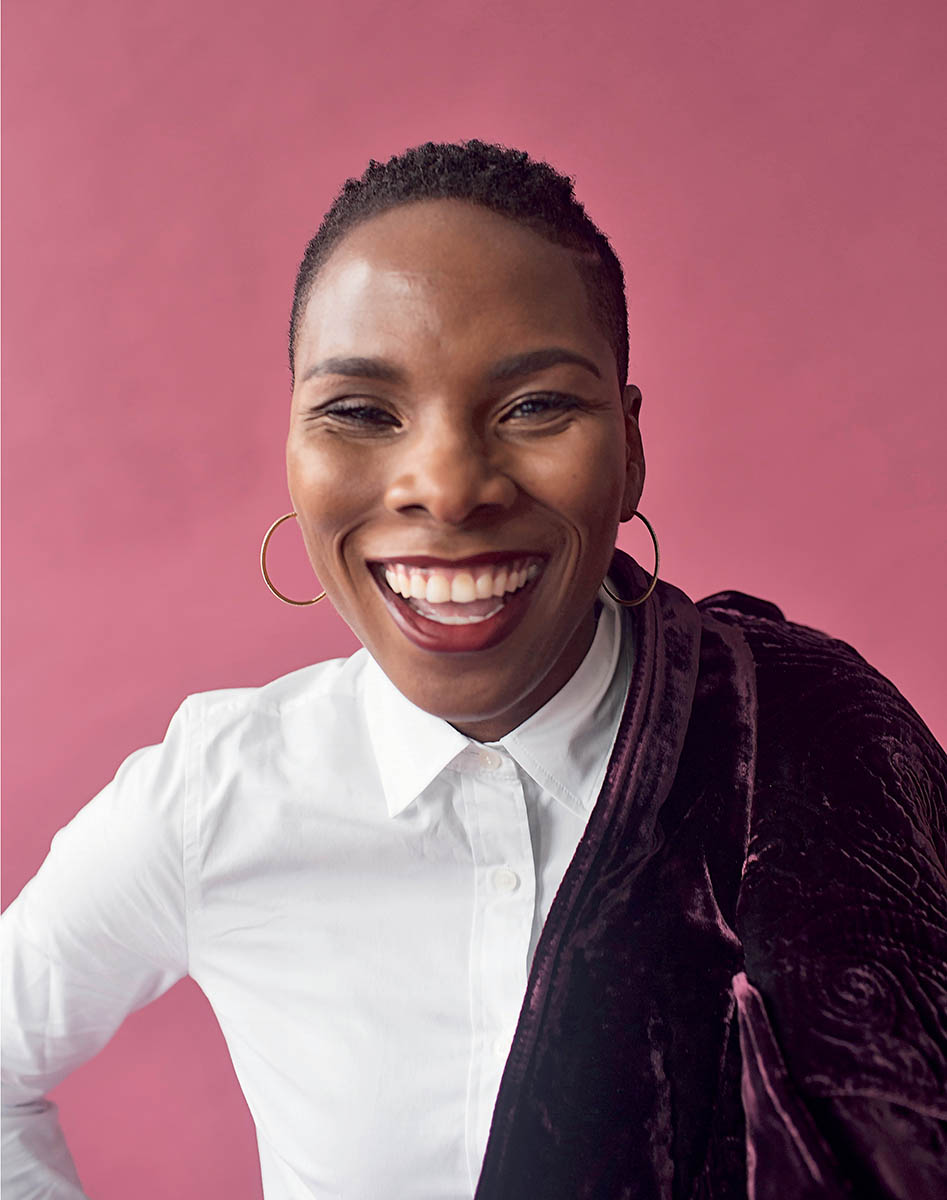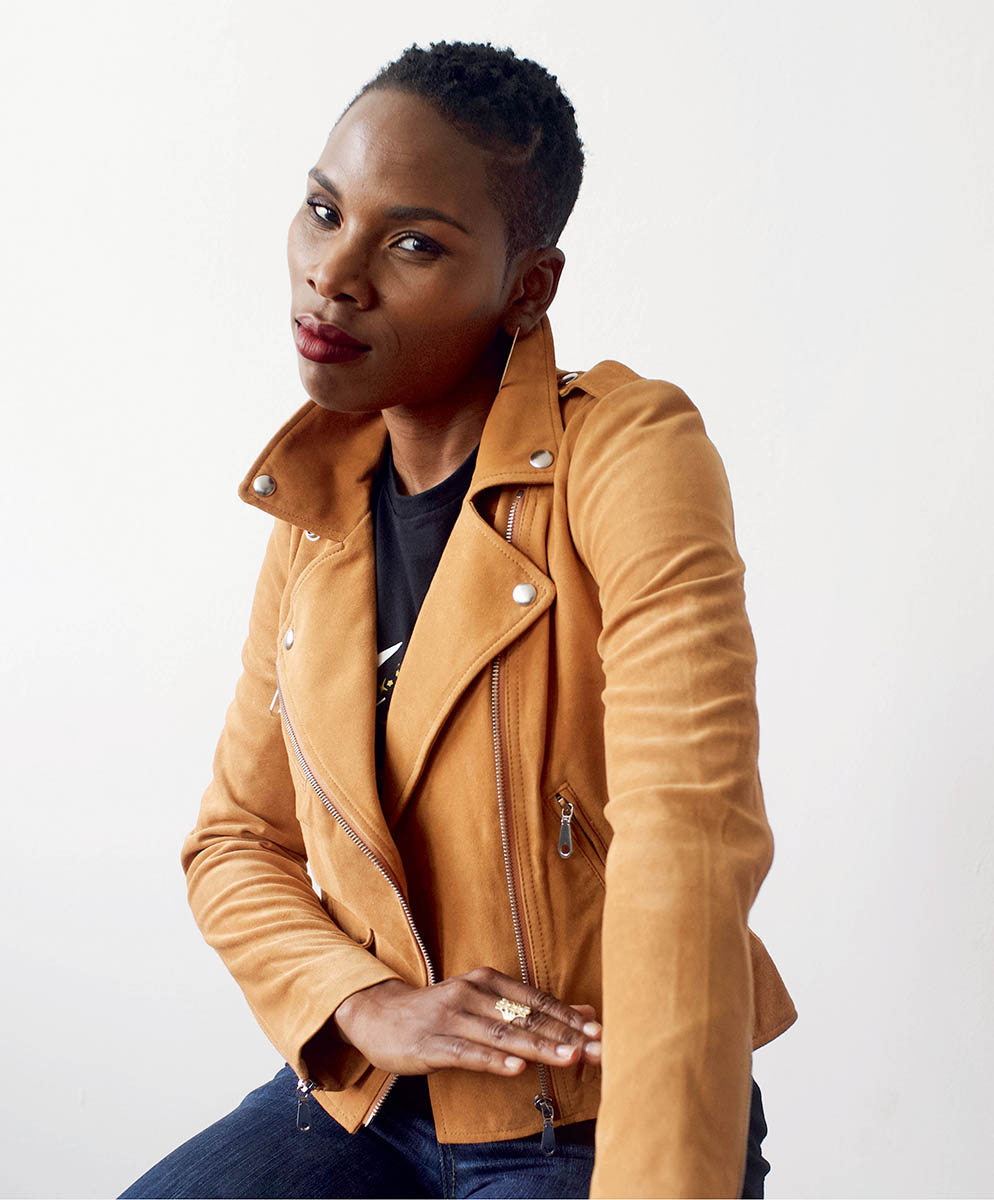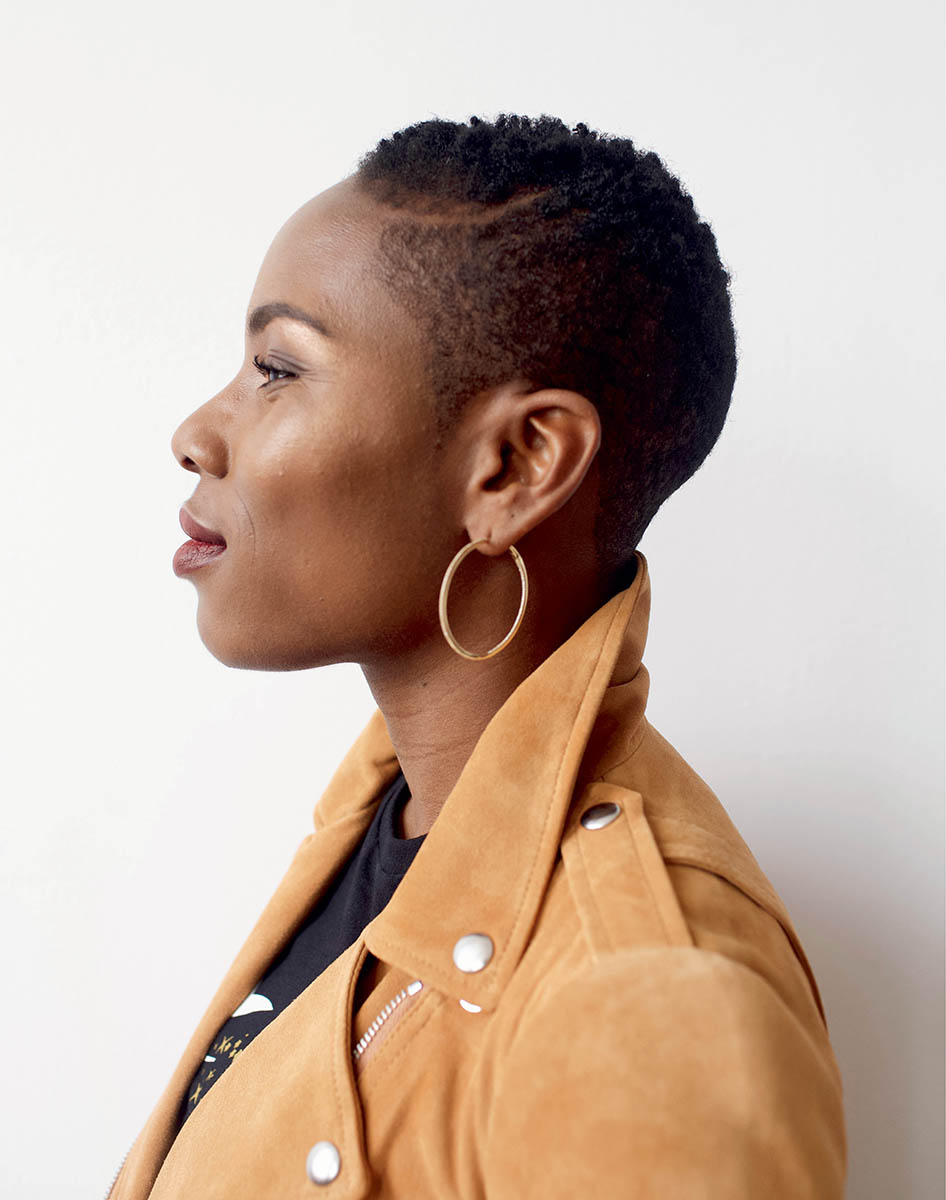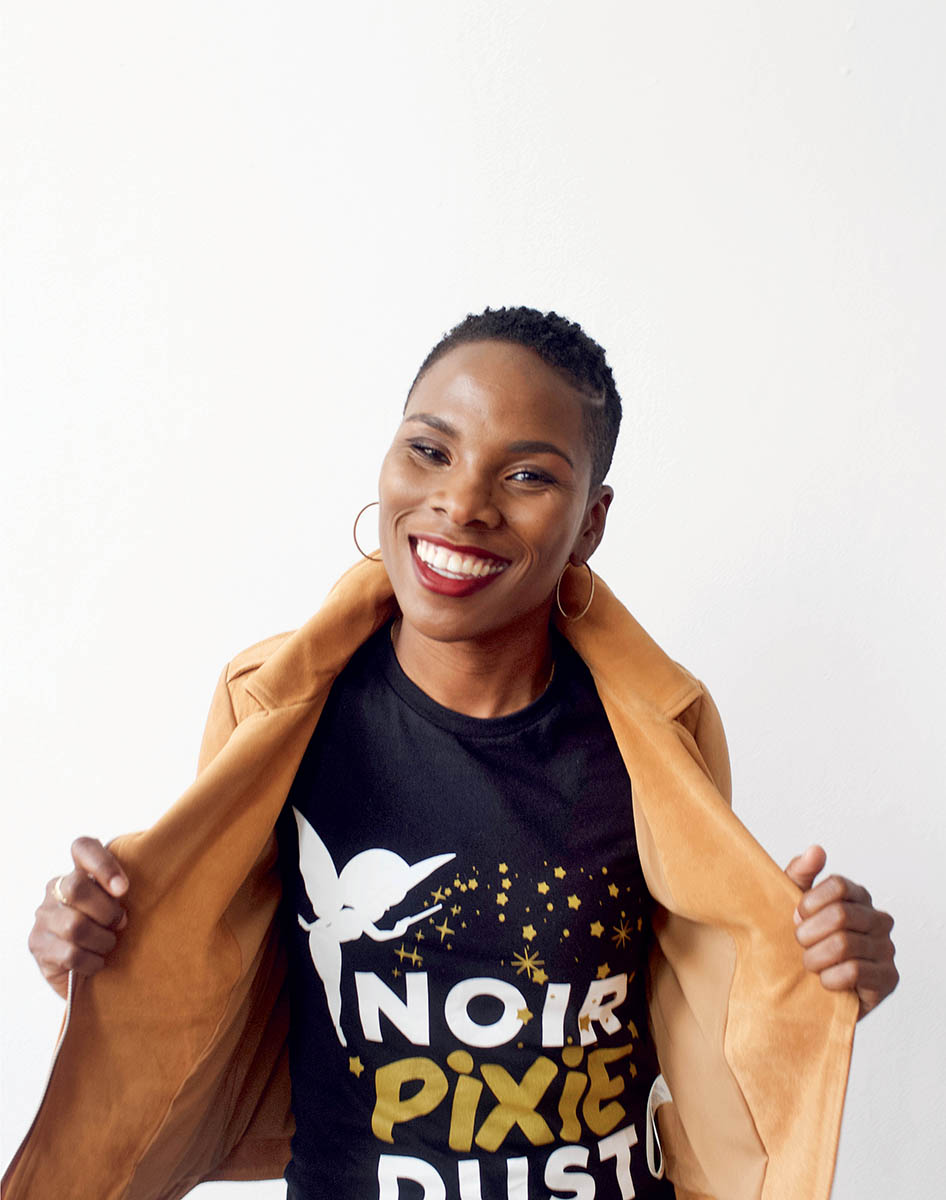

In the midst of a modern Black creative renaissance—and the resounding clapback of Trump and white tears—someone must rise up to bear the responsibility of conducting draggings and serving side-eye to the masses. Who better for the job than professional troublemaker and verbal virtuoso Luvvie Ajayi?
By Lindsey Day
Photography by Deun Ivory
Lettering by Erin Ellis
As a New York Times bestselling author, fifteen-year (award-winning) blogging veteran, speaker, and activist, it seems as though there isn’t much Luvvie Ajayi hasn’t accomplished. She was named on Oprah Winfrey’s inaugural SuperSoul 100 list as someone who “elevates humanity,” and has been honored by ADCOLOR, Essence, Marie Claire, OkayAfrica, and dozens of other esteemed platforms.
Her superpower? Breaking down complex, culturally sensitive topics into bite-size, digestible—if slightly salty—pieces. She doesn’t mince words, and she will tell you about yourself. Yep, you too.
Whether dissecting the latest “Cheeto Satan” rant or pouring out her sentiments in posts like “About the Weary Weaponizing of White Women Tears” on her blog; chatting with faves like Jenifer Lewis and Myleik Teele about their lives and careers on her podcast, Rants and Randomness; or running the Red Pump Project, the HIV-education nonprofit she cofounded, she does it with heart and a huge dose of realness. For obvious reasons, I couldn’t wait to talk to this dynamic woman about her mission, her process, and how she’s learned to conquer her fears.
You’re a woman of many titles, some self-proclaimed: Professional Troublemaker, Shady Nigerian, Supreme Side-Eye Artist . . . Who is Luvvie Ajayi? What is she on this earth to do?
Oh my gosh, that’s such a good question. I am a writer and a truth-teller. And I think I’ve been placed on earth to bring joy, to make people think. Honestly, to change it a little bit. I have a gift of having people listen to big ideas in small bites and understanding it.
Tell me a bit about your early life. What brought your family to the US from Nigeria, and how did that move shape your upbringing?
I was born and raised in Nigeria and we came here [to Chicago] when I was nine. We had family here, we’d been here on vacation, and I think my mom just thought it was the right time. But we were culture-shocked, for sure. Going from where you are the default, in terms of what you look like, to being the new kid—all of the sudden your accent is strange, your name is strange, everything is strange. It’s a shock to the system. But at nine, you’re at the age of adapting, and I was able to adapt.
I actually listened to how my friends were speaking to learn how to lose my accent, and I lost it in a couple of years. When you’re young, you don’t want to stand out. That’s not when you think being different is “cute.” Essentially I was like, Okay, how do I become less different? All right, your accent is different. Okay, so we begin to talk different. I had lost most of my Nigerian accent by the time I started high school.
Was there a community or anything that helped give you a sense of place during this transition?
I mean at home, I was a fully Nigerian girl—Yoruba—eating Nigerian food, so I never lost touch with my culture or my sense of self in that way, because I had that. I think that was really kind of clutch. Just because we were here, doesn’t mean all of the sudden you stop knowing where you come from or that you’re no longer proud of who you are. And I think my mom also was an ever-present grounding force. African parents are the best grounding force, because no matter where you go or who you are, they can still check you at the drop of a hat.
I know that’s right. What kind of student were you when you were young? Did you have any favorite subjects? Were you always a “writer”?
I was a really good student. I was the kid who would come home and do her homework immediately. I was always an A student. It was something that I kind of took pride in. I was a geek, I enjoyed school, I enjoyed writing. I didn’t think, like, Writing’s my favorite subject. But it probably was.

Styling by Keri Henderson; makeup by Andrea C. Samuels
We might have been friends as kids—I was also a nerdy overachiever. [laughs] As a writer, you’ve become the person who “says what we might be thinking, but dare not to say.” Is this just your natural personality, or were there any influences?
I really think it’s my personality and my Nigerian-ness. People who know me will say that they hear my voice when they read my writing. And it’s something that gives me joy because it shows that who I am shines through in my pen. I do think a huge part of my personality is in my writing because how I think, how I feel, or how I approach the world is essentially what makes up my writing. I think it’s an innate gift.
For a long time, that’s also why I didn’t consider myself a writer. ’Cause I thought it was too easy. I thought, Oh, I can’t be a writer. Like, I’m not a novelist. Other people are novelists, other people are writers. I’m not Toni Morrison, I’m not J.K. Rowling. I’m just a girl who likes to talk about the things that she believes in and things that she’s judging, or side-eying. That’s not what a writer is! So it took me a while to call myself a writer and to own it, because of that. And I think it’s because, oftentimes, we tend to deny our gifts if they are too easy and don’t come wrapped in struggle.
That’s so real. I can really relate to that, as I know a lot of women can. Are there any women who have been important or influential in your life?
My mom, for sure. Just because of her selflessness—that’s something she passed down to me. I just think she’s a great person and woman. There’s of course Oprah, ’cause I feel like every Black girl has looked to Oprah. She expanded our world, and expanded what we thought was possible for ourselves. She’s somebody else who has insisted on living life on her own terms, insisted on being the person that she is—through all of it. That’s admirable.
How, if at all, has their inspiration guided your voice?
I don’t think about anybody else’s voice but my own, because I think that’s important. You can admire people but you don’t necessarily have to emulate them. Everybody’s journey has to be theirs. So I don’t really make it a point to try to write or do work like anybody else.
Tell me a little bit about your process as a writer. Do you ever experience writer’s block? Or does it tend to flow because you’re so heated about the subject matter?
My process is, I just sit down to write. Some people are like, “Oh my God, then I meditate . . .” I don’t have all of that. I just . . . sit down and do the work. Put pen to paper and see what happens.
Any writer’s block is more procrastination. I’m not writing because either I’m too busy, or because I’m not letting myself sit down long enough to be able to put my thoughts on paper. That’s my version of writer’s block. The times when I’m scatterbrained, I make an outline for exactly what I want to say and go off that. But I think most of the time it’s just me being like, Okay, there’s this topic that I’m really caring about right now or feel compelled to write about, and so I’m going to sit down and put my thoughts down and see how they flow. And then I do that. I go back, I edit, make my stream of consciousness more organized. I make sure that I’m saying what I mean. I get whatever else I want to say out, and then I post.
You started your blog in 2003 and were earning blogging awards in 2009, when some people—and major corporations—were still just starting to catch on. You’re an outlier. What set of circumstances or mind-set led you to blogging?
It wasn’t something that I thought about as a career, it was just something that was like, Oh, it’s cute! I’ll start a weblog. And then it just took on a life of its own. Back then, a lot of people had blogs—like, online diaries. I just never stopped. So I just kept it going, and here I am.

How has your approach changed since then? How have you stayed current with new tools and just generally staying ahead of the curve?
I don’t try to. I honestly just do what I do. I use different tools, but really, it’s just the rules of communication. The rules of communication have not changed, really. I just stay true to my voice. I don’t change my voice based on whatever platform I’m on. I’m not a different person based on where you land. I’m the same person across each one.
Do you have any pet peeves about people, like people’s digital interactions now, or is there anything about the early days that you miss?
I have a lot of pet peeves about people right now. I think essentially the difference now is people start blogs to actually make money from them, and people start blogs with strategies. Back in 2003 and 2006 there wasn’t none of that. You weren’t blogging because you thought it was going to make you rich, you were blogging just because you loved to write. So that’s definitely something that has changed about content-creating. The OGs didn’t have the expectations that people have now, and it allowed us to write in our best way possible. There wasn’t the pressure of strategy and How many page views are you going to get? Naw, we didn’t have any of that.
You’re involved in vital—and viral—conversations that are important to the culture and carry a lot of weight. You’ve said in the past that just “Being yourself can be a revolutionary act.” Does it get exhausting? Are there other voices or people in your life who you look to in those moments to feel like, “Okay, I’m not alone”?
My friends. I have a great group of friends who I can always compare notes with. When I’m having a rough day, they’ll understand. I mean—I look less outwardly to, like, “the world” and more to what is actually surrounding me. I think it’s important to curate people around us who we can look to and draw from. The people who matter the most in my life are those who I actually know. Less so the stars.
In the midst of the constant barrage of BS in the news/online, how do you decide who to “drag” or what conversation to sound off on?
I don’t know if I have a grand strategy. Honestly, it depends on the day. There’s some topics that I am compelled to write about that I just don’t end up having time to write about, if I’m traveling that day or I have deadlines looming; and then there are some days when I’m actually home when I’m able to write, and I’m like, Great, I can put pen to paper.
Sometimes I won’t have time to write about something in the moment, and my audience will let me know, “Hey, we’re looking for your voice on this.” And I’ll be like, “Oh great. Y’all actually want to hear about this topic? I didn’t have time last week but I have time now if you still want to hear about it.” I honestly just write the things that I’m compelled to write. I usually can’t be forced to write about something.
The internet is so massive, the conversations could go on forever—and to be frank, people can be assholes. How do you process things privately and make sure you’re pouring into yourself so you can pour back out into us/them culture?
I take social media breaks. I don’t typically announce them or anything, but I like, won’t be on the internet for like a week. To just kinda get my brain back, to stop some of the information overload. And to quiet my mind a little bit, because I think you get so much input online, and you end up not being at peace because you’re constantly hearing. Things being thrown at you. So yeah, I take breaks. I take naps, I go on vacation. I have day-long sabbaticals where I’m just off the grid, just enjoying life without the internet. I think that’s important.

Sometimes entrepreneurship is glamorized. The whole “be your own boss, follow your dreams” thing. What are your thoughts on that, and do you have any big sister advice for people looking to take the plunge?
The grass is always greener on the other side. I know sometimes I’m envious of people who can leave work at five p.m. and not have to touch it again until nine a.m. the next day.
There’s many days where I’m like, Dang, I miss being able to not work. You really don’t stop working as an entrepreneur. It’s one of these weird things. There are times when I am in my head like, Shoot, I didn’t reply to that email. Ah, I need to finish this media kit. It never turns off.
I always tell people that doing work for yourself is not just about the carefree, “I’m gonna run after my dreams” thing. You can actually take a leap of faith by first building your net. If you know you want to work for yourself, you don’t have to quit your job today and just be out here. You can know, “I want to work for myself,” spend a year planning it and stacking all your coins—’cause you’re going to need all the coins—and then plan your exit as opposed to how some people just expect to go out in a blaze of glory: “I quit!” No, that’s not realistic, especially if you’re a parent or you’re somebody that other people depend on for their survival. You can’t just be up and quitting if you don’t have a nest egg. Of course, if you got laid off your job all of the sudden, that’s one thing, but otherwise, you can actually plan out the best way.
Or that leap can get real short, real quick.
Correct. People romanticize entrepreneurship, especially recently. I’ve been seeing a lot of it. People just being like, “Hey, you should just be following your dreams,” or “Every moment you are working for somebody else, you’re helping somebody else build their dreams.” Some people don’t have the dream of working for themselves, and that’s perfectly fine. I don’t think we should be romanticizing it. We have to be clear that our dreams are not everybody else’s dreams. And that’s perfectly fine. You don’t have to all have the same dream. We don’t all have to think that our lives are what everybody should aspire to. My whole goal is to also let people know that, like, “Here’s the wheel, you make the decision that works for you now.”
Today, you’re a New York Times bestselling author, for I’m Judging You: The Do-Better Manual. Can you talk about the shift in mind-set from, “I’m not really a writer” to “Oh shit, I’m a bestselling author!”?
Eventually, I had to admit to myself that I am a writer. Kind of like, You’ve been doing this thing for a long time. And, yeah, you actually are gifted at it. Just because you don’t struggle at it doesn’t mean you can’t claim it.
I got the idea for my book in 2014. And I knew that, of course, I wanted to first and foremost create something that I was really proud of. And then I was like, I want to be a New York Times bestselling author! And saying that out loud, and asking people to help me see it come true—that was really important, because sometimes we think things are so far-fetched that we don’t even dream them. But I was like, I’m going to wish for this thing to happen. And when it happened—when my book came out September 13, 2016—it actually hit the Times’s list that week. Instantly. So it felt amazing. It felt amazing. I was just like, Woooow. So it is possible for us to see our dreams come true.
That’s bananas. It was surreal, but it was also like, All right, I worked for this. And this is something that I deserve and I’ve earned. So making it a point to not question our work and our value when we see these things come true is so important.
As an entrepreneur you can take a lot of L’s before you get those wins, so I can imagine it must have just been a major shift. Did this win help with the “impostor syndrome”? Or is it not that simple?
Well, it’s one of those moments where it’s like, I’m in an elite club now. I’ve absolutely earned my place in certain rooms. If you want to be really logical about it, you are now in a category that most people will never be in, so you will find yourself in rooms that most people will never be in. I thought that it was also important to share all of the journey, and to talk about it. I’m here, but it isn’t by happenstance. Here’s the work that brought me into this room. Because I didn’t want people who saw my journey to randomly think I was just, like, showing up places without earning it. So I was being very diligent about telling people about the stories. What were the processes that had to happen for me to be in this place?
We would talk ourselves out of everything if we let ourselves. But there’s no honor in that. I think women, especially, have been told that being humble to a fault is okay. We’ve been told not to be confident. We’ve been told that things sound braggadocious. No, no. Being able to say, “I’m a New York Times bestselling author, that’s why I can command certain fees, that’s why I can be in these rooms . . .” isn’t bragging, it just is.
Coming from the digital space, how did it feel to see a product you’ve worked on become a real, tangible thing, going out into the world and I’m sure blowing up your social media? What was that like for you?
I mean, it felt great. It’s humbling to see this thing that you worked on come to life. And to hold it in your hands makes it even more real. When you finish your manuscript and you’re like, Okay, the final period is here, the work is just really starting. You still have to edit, you still have to do all these things. So when you see it finally printed, it’s like . . . Oooooh. Okay. This thing that I did, it’s not just a concept anymore, it’s a thing. It’s alive, it’s here. I can share it with the world. It felt amazing.
What scares you most? What major fear(s) have you had to push through to get to this place?
Honestly, the unknown. Again, I had to push through the whole writing thing. And working for yourself is the unknown because you’re used to getting guaranteed checks. You had a boss who told you what to do. Now it’s, I am the boss, I am the bringer of everything. If I don’t work, I don’t eat. And that’s a scary prospect, because it puts the onus of everything on you.
But like with everything, you have to push past it if it’s worth doing. People think about the word fearless to mean “without fear,” but I see it to actually mean “with fear, but you did it anyway.” I don’t think anybody is fearless; without any type of fear, or any type of thing that makes them pause—without any type of thing that intimidates them. I think the difference is, there are some people who are afraid, but who are more committed to insisting that they’re not going to let the fear be what stops them.
It’s a practice. There will never be a time where there’s all of the sudden three steps to take that’ll make you stop being afraid of doing something. It just comes down to committing to push back in that moment when you’re like, “I shouldn’t do it.” You just have to swallow it down and say, “I’m gonna do it anyway.” It’s like when you’re going into a pool and the water’s really cold. You just have to step into it and just have that moment when you gasp. It’s the same thing. Like, you can dip your toe into it. Sure. And then you dip your second toe. Sure, that helps. It takes a little bit longer. Or you can just jump right into it. gc
